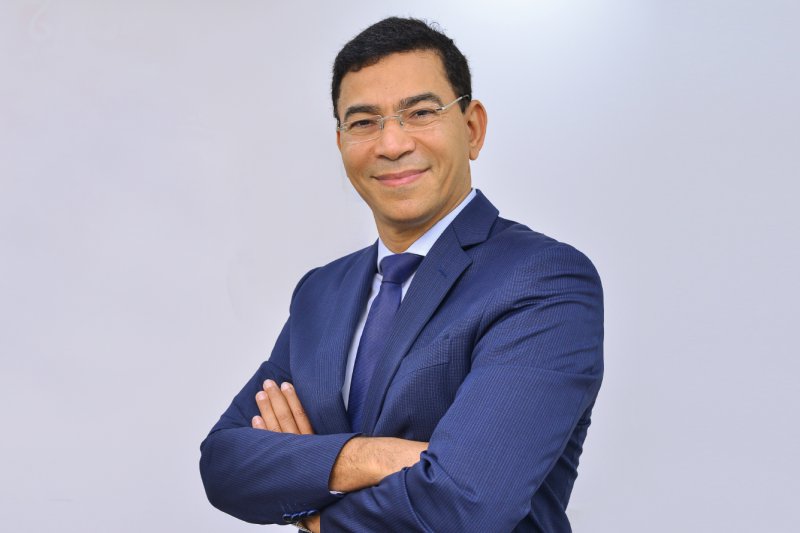With Huawei edging closer to the $100 billion revenue mark, vice president and managing director of the Middle East enterprise business group, Alaa Elshimy, tells CNME why the firm has the edge over its AI competitors, why it is not investing in Blockchain – for now – and why the United Nations could decide what machines should and shouldn’t do.

In the intensifying race to build autonomous, intelligent machines, Huawei believes it has sharpened its competitive edge in beating the world’s other technology giants.
“I haven’t seen anyone so far from an ICT point of view that has come up with specific set of products that will make AI happen,” Alaa Elshimy, Huawei enterprise business group’s vice president and managing director for the Middle East, says. “We’ll differentiate ourselves in AI through our hardware. We’re an infrastructure company and we’re very clear on that. When Microsoft presents its AI solutions, 90% of what I’ve seen is more on the software side of things and is about developing AI for business processes.”
Elshimy also believes that while the world’s biggest technology companies have made progress in embedding AI in their software, they have failed to reciprocate in terms of their hardware. “Some of them are not prioritising hardware enough in the delivery of AI, including some of the biggest ERP and database players,” he says. I don’t see there being competition to us in the AI infrastructure space today.”
I don’t see there being competition to us in the AI infrastructure space today.
Another area in which Huawei is going against the grain is its approach towards Blockchain – or lack of one. While the tech industry has incessantly sold the prospect of the distributed ledger technology being as transformative as the internet, Huawei is steering clear, for now at least. “We are not investing in Blockchain software as of now, it is more of an ecosystem play for Huawei,” he says. “In my view, I see Blockchain as a pure software play. We will have Blockchain services in our cloud eventually, but we don’t invest in Blockchain per se. It could be added to our strategy as we go, but we believe in focusing in what we’re good at, and we can’t try to do everything at once. We want to focus purely on ICT infrastructure and cloud services.”
Huawei’s 2017 revenue totalled a jaw-dropping $92.5 billion across its carrier, consumer and enterprise business groups, with the latter accounting for 9.1%, or $8.4 billion, of the firm’s global business, and Elshimy believes the firm is edging ever closer to hitting what represents a significant milestone. “We’re obviously working hard to hit the $100 billion mark,” Elshimy says. “In all humbleness, I’m almost sure we’ll hit that target this year. If it happens, we have to celebrate it, as it positions us as the clear number one for ICT players. It also puts more responsibility on the organisation to keep growing. It means the company vision is correct, the strategy is right, and that we need to continue to deliver and drive the company forward in the same direction. We have a responsibility to bring value.”
Elshimy attributes a large portion of the firm’s success to its relentless pursuit of R&D, which he says has continually delivered world-firsts in technology. “Huawei spent $13.8 billion on R&D in 2017,” he says. “We’re the first to have introduced a 32-core Intel-based server, the first to bring an AI chipset to a camera and the first to bring full-stack, AI-powered intelligent computing for the mobile data centre. We’re clear that we want to be number one, and know have had come from behind to be in that position. The ecosystem is so important, and goes across everything we do. We’re working with vertical players, and that’s a key pillar of our strategy.”
We are not investing in Blockchain software as of now.
As well as launching a $140 million global AI education initiative – which will help Huawei collaborate with developers, partners, universities and research institutions – Huawei recently launched its AI Ascend chipset series, which Elshimy believes represents a significant step in Huawei’s bid to build a hardware platform that can fulfill AI ambitions for customers of various sizes. “If you need to run algorithms for certain applications, you need a chipset and the infrastructure to run in the best possible way,” he says. “This is our key differentiator. We’re the only one to deliver the entire stack from a computing point of view, and we deliver this through our Ascend chipset and neural networks. No one else has that today.”
He adds that Huawei has already shown how the chipset can provide tangible results across a range of major verticals. “We’re building use cases for different industries, and I haven’t seen anyone doing anything similar to that,” he says. “With this chipset, you can increase the productivity of credit card application handling from 50 requests to 1,200 per day. It can increase the effectiveness of cancer detection by a factor of 50. It can reduce traffic by 8%.”
In spite of his firm belief in Huawei’s AI portfolio, Elshimy acknowledges that there remains a long journey ahead for organisations to not only understand its technologies, but also to deliver effective, enterprise-level implementations. “There are a lot of issues that need considering, like which part of the business or which process should AI be applied to?I Where will you get the best ROI? This has to be done carefully in phases. Make it happen gradually then expand it. You need goal, and you’ll go down blind alleys without one.
“AI reminds me of the early days of cloud when it had 100 different definitions. There are misconceptions around it. To deliver IoT and AI, you need three elements – cloud, connectivity and devices. All three are important pieces, but any customer that is looking to transform needs the combination of the three to deliver business solutions.”
On a regional level, meanwhile, Huawei is already collaborating with some of the Middle East’s most influential organisations, but believes work still needs to be done to ensure enterprises engineer a clear path for technological success. “Almost 35% of customers in the Middle East and Africa region are taking their digital transformation investments beyond servers, storage and networks, but a lot of companies are still not necessarily delivering the best experience. Companies are not always strategically clear on their priorities, or what part of their business they need to apply a transformation to. There’s still a level of fear in taking these steps.”
We want to focus purely on ICT infrastructure and cloud services.
He says that a selection of industries have shown the biggest appetite for technology spend and innovation. “I think smart and safe cities will see the highest areas of spend next year,” he says. “We’re also expecting a lot of business in the energy and transport industries.”
Elshimy believes there will also be broader ethical issues that will need to be tackled head on if AI is to gain widespread acceptance by society. “In my view, its biggest challenges today are around regulation and ethics,” he says. “Take autonomous cars. They’re expected to reduce accidents by 80%, but they still need to be programmed with answers. If an autonomous car is on course to run over a pedestrian, but if it swerves it will hit a wall and kill the passenger, what should it do? It’s an ethical debate. As well as teaching the machine to make the decision, it needs regulations, which should maybe be decided at a United Nations level.”





